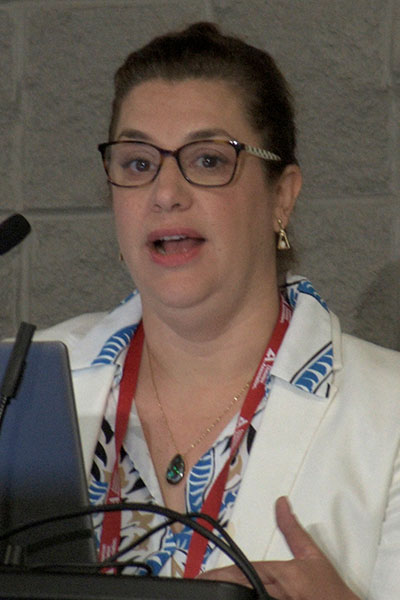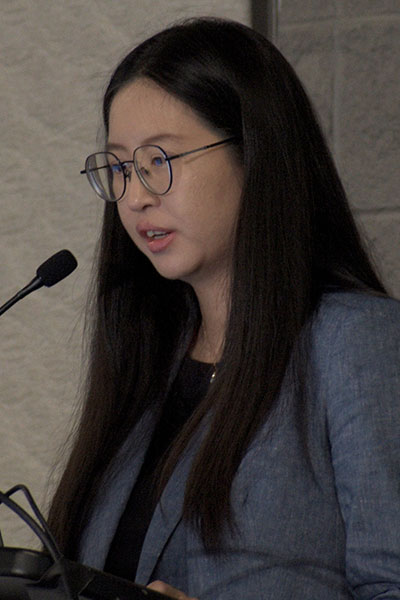
Anne Gaglioti, MD, MS, FAAFP, The MetroHealth System, has seen firsthand the impact of loneliness and social isolation on health in the experiences of her patients. Among her areas of study are continuity of care and its relationship to healing, as well as clinician networks.
“We know that more connection in these spaces promotes better health outcomes,” she said.
During the symposium Loneliness Is a Real Heartbreaker on Sunday, June 23, Dr. Gaglioti and a panel of experts discussed loneliness, its link to diabetes, and the psychological toll it takes on patients living with diabetes. The symposium can be viewed on-demand by registered meeting participants on the virtual meeting platform. If you haven’t registered for the 84th Scientific Sessions, register today to access the valuable meeting content through Aug. 26.
Dr. Gaglioti, who is also Clinical Associate Professor at Case Western Reserve University, gave a broad overview of recent developments in the study of loneliness and social isolation and the risks associated with them, as well as community context and the impact of health disparities.
Loneliness and social isolation are related but different. Loneliness is subjective and based on perception, while social isolation is more objective and based on measurable factors like number of relationships and community interactions. A study in a recent Morbidity and Mortality Weekly Report showed that one in three adults is lonely, and one in four lacks social support.
“Older adults tend to have higher rates of social isolation, while younger adults tend to have much higher rates of loneliness,” Dr. Gaglioti said. “As far as how people perceive the experiences of loneliness and social isolation, only about 20 percent of people with these conditions actually view them as a problem.”
The more socially connected patients are, the better their health outcomes. Dr. Gaglioti cited a study that showed lacking social connection is as dangerous as smoking up to 15 cigarettes a day.
“This association holds even after accounting for things like age, health status, health behaviors, and socioeconomic position,” Dr. Gaglioti said. Ultimately, she said, continued work is needed in implementing assessments and interventions for loneliness and social isolation in clinical practice.

Xuan Wang, PhD, Postdoctoral Fellow in the Department of Epidemiology at Tulane University, took a closer look at loneliness with an emphasis on diabetes.
In comparing results from data on loneliness and social isolation among the general population and patients with diabetes, there is a higher prevalence of those factors in people with diabetes.
Loneliness is also a common risk factor for patients with cardiovascular disease (CVD), which is a common complication for patients with diabetes. Dr. Wang studied whether loneliness and social isolation are associated with CVD in people with diabetes by analyzing data from the UK Biobank, and the results found a significant association.
“Our findings could potentially be explained by diabetes patients not only having a higher risk of CVD but also experiencing higher levels of loneliness than individuals without diabetes,” she said.
Her analysis also showed that loneliness was in fifth place among risk factors for diabetes patients after more well-established risk factors, such as LDL cholesterol and BMI, and above risk factors such as depression and smoking.
“It remains unclear whether the diabetes-related excess risk of CVD can be eliminated if multiple risk factors are well controlled,” Dr. Wang said.
She also looked at whether the association between traditional risk factor control and the risk of CVD differs by status of loneliness.
“Our findings indicated that the public health consequences of a low degree of risk-factor control would be greater in diabetes patients with loneliness,” she said.
In terms of intervention, studies addressed loneliness mitigation methods, such as animal therapy and technology. However, Dr. Wang concluded, it is unknown whether the changes in loneliness symptoms could translate into changes in long-term outcomes for people with diabetes, and further study is warranted.

Ariana M. Chao, PhD, MSN, BSN, RN, Associate Professor at Johns Hopkins School of Nursing, went a step further to look at the psychological toll of loneliness on people with diabetes.
She differentiated between loneliness and social isolation in subjective and objective ways, such as feelings versus number and quality of contacts, but also pointed out that alleviation of social isolation can be quick, while alleviation of loneliness takes more time.
Dr. Chao noted a significant rise in the number of patients who reported loneliness during the COVID-19 pandemic. Additionally, loneliness showed significant overlap with other mental health conditions, such as depression.
She presented data analysis that showed loneliness in association with lower cognition in older adults with and without dementia.
“If we contrast this with other risk factors for dementia, like diabetes, physical inactivity, and hearing loss at midlife, we can see that the affect sizes are fairly similar,” Dr. Chao said. She also showed loneliness is a risk factor for suicidal ideation and behavior.
Loneliness is more prevalent among people with chronic conditions, and type 1 diabetes may limit the ability to engage with other people, leading to isolation or disconnection from social interactions, she said. Checking blood glucose or using insulin may make people with diabetes more hesitant to engage in social interactions. Loneliness is also associated with reduced self-management skills and can be compounded by diabetes “distress,” or worries about struggling with diabetes, over time.
Get On-Demand Access to the Scientific Sessions
There is still time to register for on-demand access to learn about the latest advances in diabetes research, prevention, and care presented at the 84th Scientific Sessions. Select session recordings will be available through Aug. 26.